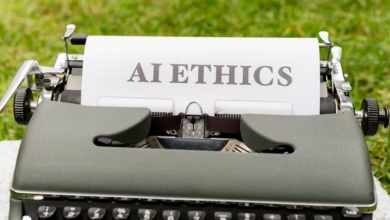Careers in 2025: The Rise of AI-Ethics Roles in Tech

AI-Ethics Roles Surge in Tech Careers in 2025
As artificial intelligence (AI) continues to permeate every facet of technology, the demand for AI-ethics professionals is skyrocketing in 2025. With AI systems influencing decision-making in healthcare, finance, and public policy, the need for ethical oversight has never been greater. According to a LinkedIn report, job postings for AI-ethics roles have increased by 150% since 2024, making it one of the fastest-growing career paths in tech. BytesWall explores the rise of AI-ethics roles, highlights key opportunities, and provides strategic insights for career seekers and employers in the tech industry.
Key Drivers Behind the Rise of AI-Ethics Roles in 2025
Several factors are fueling the demand for AI-ethics professionals in the tech sector:
- Regulatory Pressure: Governments worldwide are enacting stricter AI regulations, with the EU’s AI Act fully implemented in 2025, requiring companies to ensure ethical AI use. This has led to a 60% increase in demand for AI-ethics officers to ensure compliance.
- Public Awareness: High-profile AI mishaps, such as biased hiring algorithms, have raised public concern, with 70% of consumers demanding greater transparency in AI systems, according to a 2025 Pew Research survey.
- Corporate Accountability: Tech giants are prioritizing ethical AI to maintain trust, with 80% of Fortune 500 companies hiring AI-ethics specialists in 2025 to oversee responsible AI deployment.
- Cross-Industry Impact: AI-ethics roles are expanding beyond tech into sectors like healthcare and finance, where AI decisions impact lives, driving a 40% increase in cross-industry demand for ethics experts.
Spotlight: Google’s AI-Ethics Initiatives
Google has emerged as a leader in prioritizing AI ethics in 2025, with a dedicated AI-ethics team of 200 professionals. The company’s Responsible AI division, established in 2019, has expanded its scope, focusing on mitigating bias, ensuring transparency, and aligning AI systems with human values. In 2025, Google hired 50 new AI-ethics specialists to oversee projects like its Gemini AI model, ensuring ethical use in applications ranging from healthcare diagnostics to ad targeting. Google also launched an AI-ethics certification program, training 10,000 professionals globally to address industry-wide talent shortages.
Learn more about Google’s Responsible AI initiatives at their official website: ai.google/responsibility.
Other Companies Leading in AI-Ethics Hiring
Google is joined by several key players actively hiring AI-ethics professionals:
- Microsoft: Microsoft’s Office of Responsible AI has 150 ethics specialists in 2025, focusing on fairness in AI tools like Azure Machine Learning. Visit microsoft.com/en-us/ai/responsible-ai for more details.
- IBM: IBM’s AI Ethics Board oversees ethical AI deployment in Watson, with 100 new hires in 2025 to address bias in healthcare AI systems. Learn more at ibm.com/artificial-intelligence/ethics.
- Salesforce: Salesforce hired 80 AI-ethics professionals in 2025 to ensure ethical use of its Einstein AI platform, particularly in customer data handling. Explore more at salesforce.com/company/ethics.
Challenges Facing AI-Ethics Professionals
Despite the opportunities, AI-ethics roles come with significant challenges:
- Talent Shortage: With only 5,000 certified AI-ethics professionals globally in 2025, the talent pool is limited, making it difficult for companies to fill roles, according to a World Economic Forum report.
- Balancing Innovation and Ethics: AI-ethics professionals face pressure to balance innovation with ethical constraints, with 30% reporting conflicts with product teams over ethical concerns.
- Evolving Standards: The lack of universal AI-ethics standards complicates oversight, as 40% of professionals cite inconsistent guidelines as a barrier to effective governance.
Case Study: IBM’s AI-Ethics Team in Healthcare
In 2025, IBM’s AI Ethics Board collaborated with a major U.S. hospital to ensure ethical deployment of Watson Health AI for patient diagnostics. The team identified and mitigated bias in the AI model, reducing misdiagnosis rates for minority patients by 15%. This initiative not only improved patient outcomes but also set a precedent for ethical AI use in healthcare, showcasing the critical role of AI-ethics professionals in high-stakes industries.
Strategic Insights: Navigating AI-Ethics Careers in 2025
For career seekers and employers, BytesWall offers these strategic insights to leverage the rise of AI-ethics roles:
- Upskill in AI Ethics: Professionals should pursue certifications like Google’s AI-ethics program to gain expertise in ethical AI governance, positioning themselves for high-demand roles.
- Foster Cross-Functional Collaboration: Employers should encourage collaboration between AI-ethics teams and product developers to align innovation with ethical standards, reducing conflicts.
- Advocate for Standardization: Industry leaders should push for universal AI-ethics guidelines to streamline governance and enhance the effectiveness of AI-ethics professionals.
These strategies can help individuals and organizations capitalize on the growing demand for AI-ethics expertise.
The Future of AI-Ethics Careers
By 2030, AI-ethics roles are projected to be a standard part of tech organizations, with an estimated 50,000 professionals needed globally. In 2025, companies like Google, Microsoft, and IBM are leading the charge, but the industry must address talent shortages, ethical conflicts, and standardization challenges to sustain growth. While AI-ethics roles offer immense opportunities, their effectiveness depends on the industry’s ability to prioritize ethics over profit. As tech careers evolve, AI-ethics professionals will play a pivotal role in shaping a responsible future for AI.
BytesWall: Your Source for Tech Career Insights
Stay Ahead in Tech Careers
What are your thoughts on the rise of AI-ethics roles in 2025? Share your insights in the comments and join the conversation with #AICareers2025!
Discover more cutting-edge tech insights at BytesWall.com—your premier destination for AI, tech, and innovation news!

